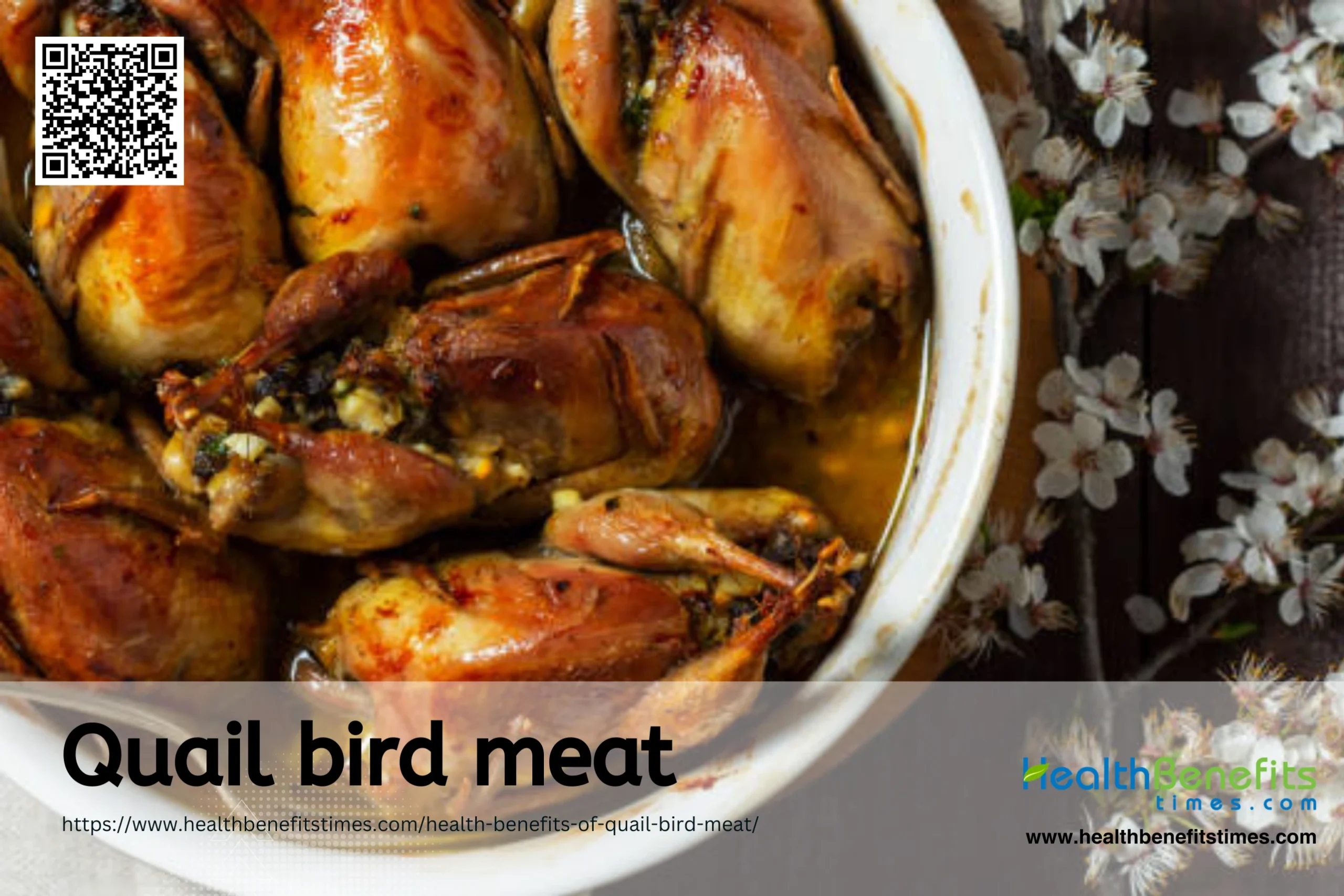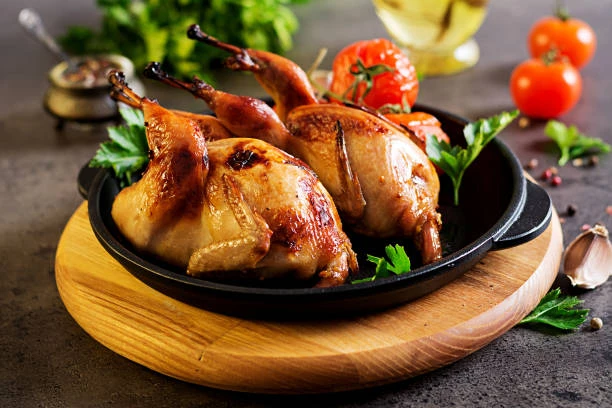
What is Quail bird?
A quail is a small bird with a short tail that belongs to the pheasant family Phasianidae. There are about 130 types of quail worldwide, with most (95 species) being Old World quail in the groups Phasianinae or Perdicinae. Quail have a unique shape and color, with buff feathers streaked in hues like blue, cream, white, and black. They have sturdy, long legs and pointed wings, and are usually smaller and less sturdy than partridges. The common quail (Coturnix coturnix) is the most well-known Old World quail and the only migratory gamebird, flying between Europe, Asia, and Africa. New World quail, like the bobwhite, California quail, and Gambel’s quail, are grouped in the family Odontophoridae. Quail like open areas and brushy spots, feeding mainly on seeds, berries, leaves, roots, and some insects. The male quail may assist in incubating the dozen or so eggs laid by the female in spring, with the young staying with their parents for the first summer. Quail are valued for their tender, tasty meat and eggs.
What is quail meat, and why it’s becoming more popular?
Quail meat production has been growing and gaining popularity in recent years due to its delicate flavor, low fat and cholesterol content, and high nutritional value. Quail meat is rich in protein, minerals, and vitamins, and has high organoleptic characteristics like juiciness, aroma, and delicate texture. It is an ideal food for all ages, with less shrinkage during cooking and being easier to serve. The consumption of quail meat has gained increasing favor among consumers who appreciate its texture, flavor, and health benefits. Quail meat can be used to produce healthier products like meatballs, nuggets, and sausages that are high in protein, minerals, and vitamins. With its small size, quick growth, and efficient feed conversion ratio, raising quail for meat is becoming a more sustainable and viable option, especially in areas where chickens are banned.
Nutritional Profile of Quail bird meat

Protein Content
Quail meat is an excellent source of protein, containing 22-25% protein, which is higher than chicken meat. The protein in quail meat is also of high quality and contains all the essential amino acids required by the body. A daily intake of two quails can provide the human body with 27-28g of protein and 11g of essential amino acids.
Vitamins and Minerals
Quail meat is a good source of several vitamins and minerals. It contains higher amounts of iron, zinc, and selenium than chicken meat. Quail meat is also a good source of vitamin B12, which is important for the nervous system and the formation of red blood cells. The wild quails meat was higher in protein, Fe, Zn levels compared to the farmed quail meats.
Fat Composition
Quail meat is lower in fat than most other meats, containing less than 3% fat. The fat in quail meat is also of high quality and contains a higher proportion of unsaturated fatty acids than saturated fatty acids. This makes quail meat a good choice for people who are trying to maintain a healthy diet.
Health Benefits of consuming Quail bird meat
Quail meat is getting attention for its possible health perks and nutritional value. Studies have looked into how different dietary supplements can affect the quality, nutrition, and health advantages of quail meat. This review brings together the main discoveries from various research papers to offer a complete insight into the health benefits of quail meat.
1. Weight Management
Quail meat has many benefits for weight management. Research shows that adding certain supplements to quail diets can help improve growth and feed efficiency, which are key for maintaining a healthy weight. For example, using Turkish propolis in quail feed can enhance feed efficiency and body weight gain without increasing belly fat, acting as a natural alternative to antibiotics in chicken diets. Selecting quail lines for higher body weight in Japan has proven that some breeds can yield leaner meat with more protein and less fat, ideal for weight-conscious consumers. Adding catechins from green tea to quail diets can boost meat quality by improving water retention and lowering blood sugar and cholesterol levels, all without compromising fattening performance. These discoveries indicate that optimized quail meat production can be a valuable part of a weight management plan due to its positive growth effects, lean meat quality, and potential health perks.
2. Heart Health
Research shows that adding black cumin oil to quail diets can improve lipid profiles, which is good for the heart. Black cumin oil helps liver function and antioxidants, important for heart health. Also, feeding quails black cumin and coriander seeds can change the meat’s fat composition, increasing unsaturated fats that lower bad cholesterol. Using Maca powder in quail diets lowers cholesterol levels, adding more heart benefits. This suggests that quail meat, especially with these dietary boosts, can be a healthy choice for your heart.
3. Improved reproductive health
Adding guanidinoacetic acid (GAA) to the diet of meat-type quail breeders has been proven to boost reproductive functions and offspring performance. The right levels of GAA can enhance creatine levels in eggs and the muscles of the young birds, leading to improved fertility, less embryo loss, and higher egg hatch rates. Introducing camphor to Japanese quail diets has shown positive effects on reproductive functions like increased testosterone levels, libido, fertility, and hatchability. Including Katuk leaf in quail feed has also been linked to better fertility and hatch rates due to its nutrients like phytosterol, β-carotene, vitamin C, and α-tocopherol. Supplementing with Palm Pollen and Panax Ginseng has significantly improved reproductive traits such as sperm health while decreasing abnormalities. Yucca schidigera extract has been effective in counteracting the harmful impact of lead exposure on reproduction, enhancing fertility and hatchability rates. Lastly, dietary oils like fish oil and flax oil are recommended for their positive effects on egg production, fertility, and hatchability in quails. These studies suggest that different dietary supplements have the potential to enhance the reproductive health of quail birds.
4. Improves physiological growth
Quail meat is packed with benefits that help quails grow stronger. Research shows that adding certain supplements to their diets can really boost their growth and health. For example, giving quails black cumin cold-pressed oil (BCO) helps them gain weight, improves liver function, and boosts their antioxidant levels while reducing harmful bacteria in their guts. Adding sodium butyrate (SB) to their diets also helps quails gain weight, convert food better, and improves their overall health, especially when given throughout their growth period. Using guanidinoacetic acid (GAA) for meat-type quail breeders can enhance their reproduction and the health of their offspring, leading to better weight gain and food conversion. Moreover, adding DL-Methionine to their diets can significantly improve their growth, muscle yield, and antioxidant activity. Propolis supplements are another great natural option that can enhance growth and food efficiency in quails, serving as a good alternative to antibiotics. These dietary tweaks really make a difference, promoting better growth, health, and meat quality in quails, making quail meat a smart choice for consumers.
5. Boosts immune response
Quail bird meat has many benefits, especially in boosting the immune system. Research shows that adding omega-3 fatty acids to quail diets improves antibody response and antioxidant levels in the meat, supporting immunity. Zinc sulfate and chromium picolinate in quail diets during heat stress also enhance immune responses and meat quality. Bee pollen boosts the immune system by increasing immunoglobulin A levels. Taurine in the diet improves immune responses, seen in increased thymus and bursa of Fabricius weights and better foot web index. Aloe vera and clove supplements improve immune health without affecting other blood parameters. These findings show that quail meat with specific supplements can enhance the immune system and offer health benefits.
6. Enhance bone health
Studies have shown that adding omega-3 fatty acids to quail diets can greatly improve bone structure. For example, a study on Japanese quail revealed that including omega-3 fatty acids not only boosted antioxidant levels and immune function but also had a positive impact on the strength of the tibia bones. Furthermore, using herbal oil blends like rosemary, black cumin, and clove in quail diets can increase antioxidant levels, promoting better overall health. This indirectly supports bone health by reducing oxidative stress and aiding nutrient absorption. These findings underline the potential of quail meat as a functional food that can enhance bone health through its nutritional richness and antioxidant properties.
How to Incorporate Quail Meat into Your Diet
Quail meat is a versatile protein that you can cook in many ways. You can roast, grill, pan-fry it, or add it to stews and soups. It has a delicate flavor that goes well with herbs and spices. Make sure to cook quail until it reaches 165°F (74°C) inside to kill any harmful bacteria. You can swap quail for chicken in salads, sandwiches, or main dishes. Try making quail egg foo young or quail meat pies. Quail meat is a lean protein with fewer fats and calories compared to other meats, which makes it a healthy option for managing your weight. Adding quail meat to your meals is a tasty way to bring variety and nutrition to your diet.
Potential Side Effects and Precautions
Quail meat can be a healthy addition to your diet, but it’s essential to be aware of some possible side effects and precautions. Eating too much quail may raise your cholesterol levels, contribute to kidney stones, and trigger allergic reactions in some people. If you’re pregnant or have a weakened immune system, it’s crucial to only consume fully cooked quail to prevent foodborne illnesses. Individuals dealing with joint pain or inflammation should steer clear of quail meat as its high protein content could worsen these issues. Always follow proper food safety practices like cooking quail thoroughly to eliminate any pinkness and washing your hands, surfaces, and utensils. Before making quail a regular part of your diet, especially if you have specific health conditions or dietary restrictions, consider consulting a healthcare professional for guidance.
Comments
comments